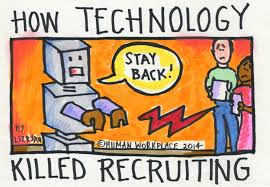We often associate technology with efficiency. Input goes in and the output comes out. However, the mistake we generally do is that we often equate efficiency with effectiveness. A process doesn’t become self-aware once we automate it. For the process to actually provide us with any meaningful input we have to first understand that the process we are actually automating is actually sound in the first place.
We talk about how the way we do business is changing and how the world as we know will still are using the same questions that were developed by Henry Ford. The questions regarding “Where did the Candidate Work?” or “What was the length of employment at your former organization?” actually serve as no indicator of a person’s capability however even then the responses to these questions are used to serve as red flags. Is it always necessary that a person who has served his former employer for a long duration has loyalty as a trait? Is it not possible that the person was inefficient enough to not get a decent job in any other company?
There can be no anti-technology stand in today’s business environment. However, by scaling up a deficient process by the means of technology will only compound its problems and scale up all of the problems that were inherent to the process. Mere replication is not going to solve any issue in this case.





5 Comments. Leave new
Good but more explanation is required..
well a person flipping companies in one year or so is really not good for company. And in professional websites, they add the projects they done, others recommendation,endorsements and experients and achievements. This gives an overall idea of person..Thats it
informative
But Technology driven recruitment could be good too. In ways, Google uses it for technical positions.
Because much of the online recruiting process may involve emails and possibly telephone interviews, it can be viewed as somewhat impersonal.